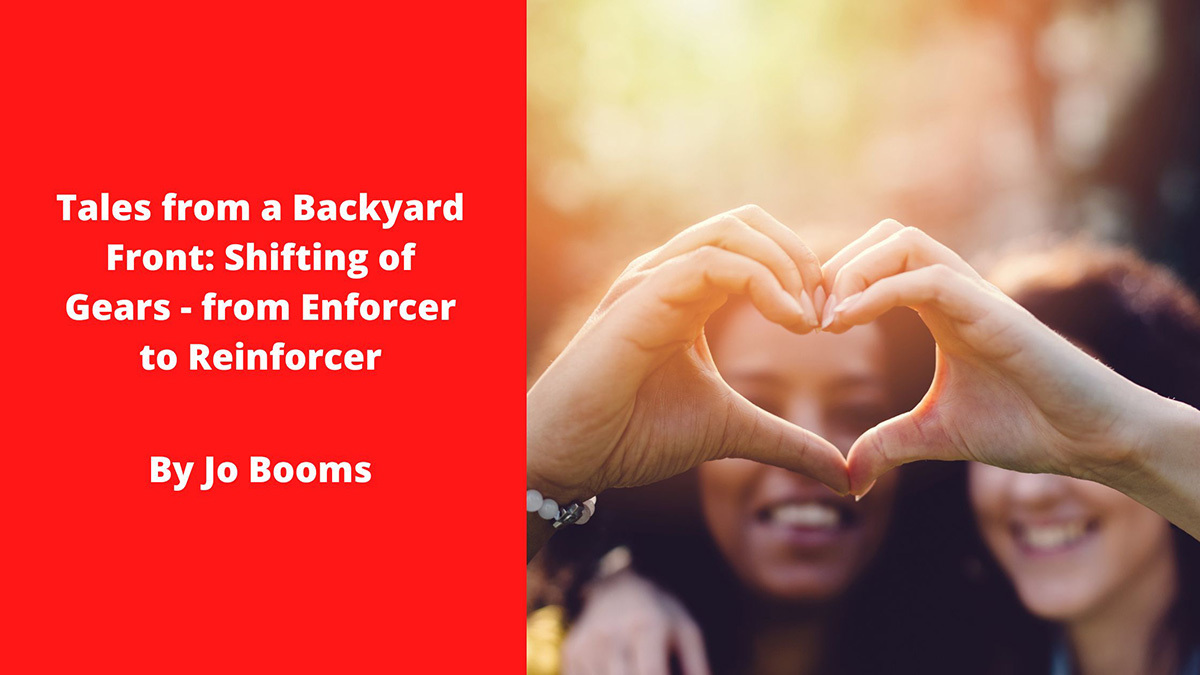Tales from a Backyard Front: Shifting of Gears - from Enforcer to Reinforcer

Tales from a Backyard Front: Experiences & Insights from Colorado’s Intellectual and Developmental Disabilities System
Blog by guest blogger Jo Booms
Note: This post relies on lessons learned in previous Tales from a Backyard Front blog posts. To read them, just go back to the main blog page and scroll up.
One of the most powerful transformations one can make while working with people with Intellectual and Developmental Disabilities (IDD) is to let go of power. As we saw in a previous blog post, many workers believe that in order to get results for people with IDD, workers must be enforcers wielding power over people with IDD. Just like the rest of humanity, though, people with IDD don’t like to be ordered around.
When I was thirteen, I began volunteering with middle school students with IDD. I approached everything as a peer. It's much less threatening to people with IDD to be part of a team than to be teamed-up on. Everyone does everything better in environments they find respectful and non-threatening.
In the IDD system, we think of reinforcers as snacks or outings given as rewards for progress. But the most powerful reinforcer should be us, those who work with people with IDD. Shifting gears to being a reinforcer – that is, someone who is rewarding for people with IDD to be around, may seem like it’s a downshift - but it’s an up-shift because you increase the effectiveness of everything you do for everybody you work with. If the act of simply being around you is rewarding to people with IDD, everything else comes so much more easily.
As to how to accomplish this, the first step is to listen and learn about each of the people with IDD you work with, from themselves. Client files give insight on how the person has reacted to their treatment by the system but can’t tell you who the client is. Only the client can tell you that. Because the system has so often mistaken harshness for effectiveness, many people with IDD are afraid to open up, making listening a multi-sensory effort. How does her voice sound when she says she’s happy with how her job is going? Does it match her body language? Has she mistaken the question for a multiple choice one in which “yes, the staff person is always right” is the only acceptable answer?
To listen, you often must take five. This may seem like an unproductive use of time but listening with everything you have to everything the client wishes people would understand is a demanding task and it will not be rushed. So, sit down on your break and have a snack with the person. Ask them about other aspects of their lives. Be a safe space for sharing. Rushing from task to task may look productive but all you’re doing is getting tasks done while the person with IDD remains hidden. This is a big part of how I got to be friends with Jeanie, my friend of many years who received services through Colorado’s IDD system. She was the only client who stayed through lunch when I started working at her day program in my late twenties. She and I ate together every day – no timed activities, no results needed, all we had to do was eat lunch and talk. I learned then of her powerful insights into the system. I learned about her family and how much they meant to her. I learned that many of my assumptions about people with IDD were wrong. I learned that many of my observations as a teen – that people with IDD should have the same right to fears and comfort, grief, joy, and sense of humor as everyone else has – were right on target. When you’re dying of an incurable genetic developmental disability as was my school friend, Hayley*, tears are absolutely appropriate and the teachers who put her in time out for crying for all she was losing are really the ones who should have been in time out so they could stop and reassess the moment. It’s been many years since Hayley died. I haven’t forgotten what the system put her through in the name of trying to program normal, reasonable, human emotions out of her. I’m glad I took the time to know and understand her.
Hopefully, every one of us has experienced the joy of someone else truly understanding who we are. If you have, you understand how rewarding that connection can be. That’s what you’re aiming for. It’s invaluable to all involved.
So go forth and be a reinforcer!
*Name has been changed to protect confidentiality


